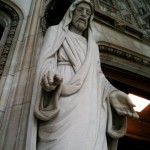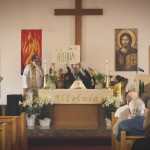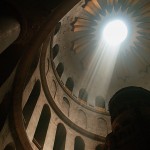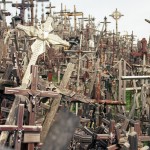Telling or living the story of our salvation as a resurrection without a cross, as many contemporary Americans sometimes do, is to forget that we are made well by suffering, by Christ’s lifelong self-offering with its crescendo at the cross and by our willing participation in his suffering.
We are not raised to new life without a saving death, both Christ’s dying and our participation in Christ’s dying.
The life in Christ involves Good Fridays and Holy Saturdays and we don’t get to Easter without them.
Telling and living the story of our salvation as a cross without an incarnation, as many contemporary Americans also sometimes do, is to forget that God so loves humanity that he becomes one of us–identifies himself forever with those he made in his image–in a startling, infinitely personal ratification of his work in forming us from the dust.
God is now “bone of our bone and flesh of our flesh.” The poor are made rich because God weds himself to our weakness. The “seed of the woman” comes to crush the head of the serpent.
By the incarnation, the cross is grounded in–and interpreted by–both the radical “yes” of Mary and the radical “yes” of God. There is a sacred cooperation between God and humanity here–a renewal of covenant relationship–that begins at the annunciation and is made more sure by everything that follows.
God was in Christ Jesus reconciling the world to himself, loving us to the bitter end. He submits to human contingency and the rigors of human existence as well as to fallen humanity’s dark brutality and the worst that spiritual dark powers can do to God and to man in Jesus, knowing that this “long defeat” will in time banish all darkness and restore us to light, will revive our fellowship with God.
And the Word became flesh and dwelt among us. The glad tidings of the angel choir tell us that Bethlehem and the infant to be found there in a feed trough are the good news that makes Golgotha and the man hanging there as a curse on a tree the good news also. The hardwood of the manger prefigures and interprets the hardwood of the cross.
The whole arc of downward humility and vulnerability–on down to the deepest ravines of pain and suffering, rising up to exaltation and glory–saves us and saves the cosmos.
If we leave any moment of Christ’s vicarious life among us (as one of us, for us) out of this gospel story or our living of it–the impoverished birth, the desert temptations and deprivations, the unsettling parables, the rescued adulteress, the cured lepers, the calming of the sea, the feeding of the thousands, the impossible challenges of his great sermon, the uncreated light that shines from his transfigured flesh, the servant who washes feet, deep friendships betrayed, the truth on trial, the torture of innocence, the horrific brutality of the cross, the silent grave, the preaching to the captives, the taking of hell’s gates, the resurrection of the body of Jesus, the many appearances in flesh and bone, the ascension that takes our nature forever into the hidden life of God–we make the story of salvation partial and rob it of beauty; the story of salvation can become twisted, ugly–even manipulative and coercive–a reflection of our disdain for ourselves and the world rather than a declaration and demonstration of God’s infinite favor and charity toward all that he has made.
While man hates himself–even imagines that God hates him–God so loves humanity that he becomes human; this is God’s judgment on mankind: I will so identify myself with you, so join myself to you, as to be numbered forever as one of you.
While man abandons his humanity–is inhumane toward his fellows, is disgusted with the race of men–God embraces humanity, remains truly human in Jesus Christ for eternity.
While we seek to escape our humanity–thinking disembodied existence somehow higher or purer than this incarnate state–matter’s Maker weds himself forever to our flesh (Bonhoeffer).
The gospel tells us that when God made humanity his judgment on what he had made was to declare us “very good.” When we fell from our original goodness his judgment concerning us was to become one of us.
What greater solidarity does a good Creator have to demonstrate to the world–and to religious and demonic despisers of humanity–than to become what he has made?
We might end there and the story tells us that God sides with man against all enemies of mankind, including man’s hatred of himself.
What greater love than to become what he has made?
The gospel answer is of course that he also died for us and with us, that he also rose for us, bringing us with him, that we might become what he is (partakers of the divine nature) just as he became what we are.
God’s first judgement is to declare us “very good.” God’s next judgment is to unite himself to humanity despite a wide gulf between his nature and what we had made of ourselves. Who knowing this–knowing Christ–fears the judgment of God? Perfect love casts out fear.
How we ever made the Gospel about anything other than this great beauty can be chalked up not to what God has done–not to what God has said–but our own incapacity to see this great love and to believe on it.
If the Gospel you hear doesn’t sound like this, the preacher is doing it wrong.













